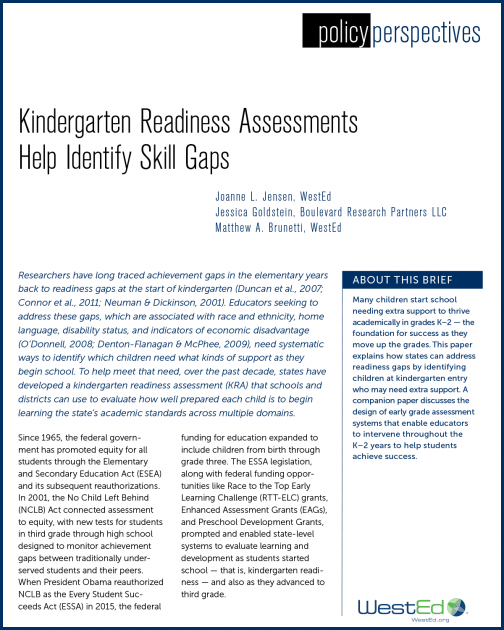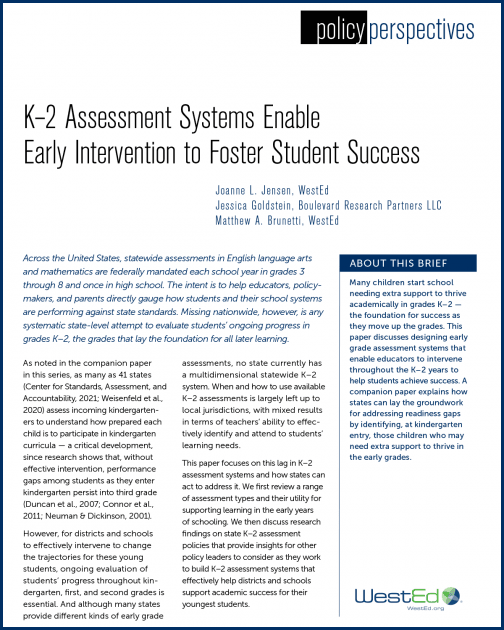Many children start school needing extra support to thrive academically in grades K–2 — the foundation for success as they move up the grades. These Policy Perspectives papers explore how early assessment systems can help schools and districts support the academic success of young learners.
Kindergarten Readiness Assessments Help Identify Skill Gaps
By Joanne L. Jensen, Jessica Goldstein, and Matthew A. Brunetti
 Researchers have long traced achievement gaps in the elementary years back to readiness gaps at the start of kindergarten. Educators seeking to address these gaps, which are associated with race and ethnicity, home language, disability status, and indicators of economic disadvantage, need systematic ways to identify which children need what kinds of support as they begin school.
Researchers have long traced achievement gaps in the elementary years back to readiness gaps at the start of kindergarten. Educators seeking to address these gaps, which are associated with race and ethnicity, home language, disability status, and indicators of economic disadvantage, need systematic ways to identify which children need what kinds of support as they begin school.
To help meet that need, over the past decade, states have developed a kindergarten readiness assessment (KRA) that schools and districts can use to evaluate how well prepared each child is to begin learning the state’s academic standards across multiple domains.
In this paper, we review the status of states’ development of KRAs and how states are using KRA data to profile skills at kindergarten entry, help track longitudinal progress, provide early warnings for needed intervention, and guide policy decisions.
K–2 Assessment Systems Enable Early Intervention to Foster Student Success
By Joanne L. Jensen, Jessica Goldstein, and Matthew A. Brunetti
 Across the United States, statewide assessments in English language arts and mathematics are federally mandated each school year in grades 3 through 8 and once in high school. The intent is to help educators, policymakers, and parents directly gauge how students and their school systems are performing against state standards. Missing nationwide, however, is any systematic state-level attempt to evaluate students’ ongoing progress in grades K–2, the grades that lay the foundation for all later learning.
Across the United States, statewide assessments in English language arts and mathematics are federally mandated each school year in grades 3 through 8 and once in high school. The intent is to help educators, policymakers, and parents directly gauge how students and their school systems are performing against state standards. Missing nationwide, however, is any systematic state-level attempt to evaluate students’ ongoing progress in grades K–2, the grades that lay the foundation for all later learning.
This paper focuses on this lag in K–2 assessment systems and how states can act to address it. We first review a range of assessment types and their utility for supporting learning in the early years of schooling. We then discuss research findings on state K–2 assessment policies that provide insights for other policy leaders to consider as they work to build K–2 assessment systems that effectively help districts and schools support academic success for their youngest students.
